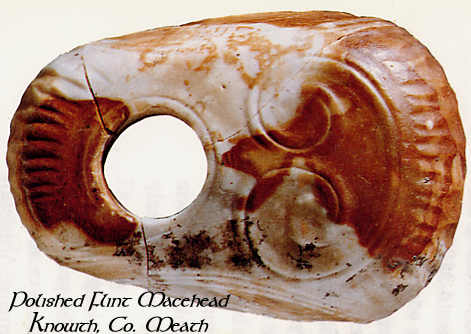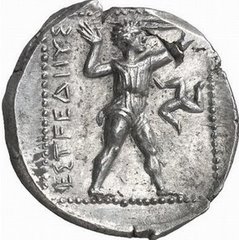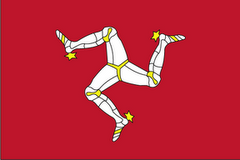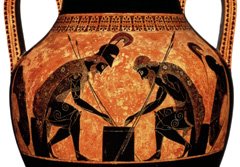
SICILY. Syracuse, Agathokles. (Ca. 317-289 BC). Gold decadrachm (4.30 gm). Sicily, Syracuse, Struck ca. 317-310 BC. Laureate head of Apollo left, tiny cantharus behind / ΣΥΡ—AK—O—ΣIΩ[N], fast biga right, triskeles below. BMC 339. The cantharus symbol not represented in SNG ANS, SNG Copenhagen, SNG Lloyd, Boston, Gulbenkian, Pozzi or Weber. Magnificent mint state. The denomination may be called either a drachm, reflecting its weight, or a decadrachm, reflecting its value in terms of the silver equivalent. For the Greeks, silver was the measure of value.

GRIECHISCHE MÜNZEN (GREEK COINS)
->Sizilien
->Syrakus
4212.
Agathokles, 317-289 v. Chr.. Tetradrachme 305/295 v. Chr., auf den Feldzug gegen die Karthager. Kopf der Kore Persephone / Nike vor Tropaion, im Feld Triskeles. SNG ANS 666. 17.14 g. Fein getönt Vorzüglich
==========

GRIECHEN
SIZILIEN
SYRAKUS
Objekt-Nr.: 35
Agathokles, 317 - 289 v. Chr. Tetradrachme (16,93 g.), 2. Periode, 310 - 305 v. Chr. Vs.: Kopf der Arethusa n. l., darum drei Delphine. Unten FI. Rs.: Quadriga n. l., darüber Triskeles, im Abschnitt SURAKOSIWN u. Monogramm AI. M. Ierardi, Tetradrachms of Agathokles of Syracuse, AJN N.S. 7-8, 1996 - 1996, 67 (stgl.). ss-vz

GRIECHISCHE MÜNZEN (GREEK COINS)
SICILIA
SYRAKUS. Agathokles, 317-289 v. Chr.
AR-Tetradrachme, 304/289 v. Chr.; 16.68 g. Persephonekopf r.//Nike r. errichtet Trophäe, unten l. Triskelis. Ierardi 153; SNG ANS 675; Sehr schön

GRIECHISCHE MÜNZEN (GREEK COINS)
SICILIA
SYRAKUS. Agathokles, 317-289 v. Chr.
AV-50 Litren, 317/310 v. Chr.; 4.21 g. Apollokopf l.//Biga r., unten Triskelis. SNG ANS vergl. 549 ff.; SNG München vergl. 1189 ff. R Sehr schön

Sicily
Syracuse
Estimate: CHF 650.00
Agathokles, 317-289. Stater (Silver, 8.02 g 10), 317-310. Head
of Athena to right, wearing Corinthian helmet ornamented with
Pegasus. Rev. Pegasus flying left; below, triskeles. SNG ANS
554 ff. Attractively toned. Extremely fine.
=========================


B3253. LYCIA, KUPRULI? ca. 5th-4th century BC.
Winged diety r./Triskeles within square incuse.
AVF. Test cut. Rare.
========
 5181. L. Seius, proconsulship, after 250 BC.
5181. L. Seius, proconsulship, after 250 BC.
AE18 of Panormos Sicily, Plant 874.
Triskeles with gorgoneion at center/Legend with D D at center.
VF. Scarce.
=========
Source:
http://www.coinarchives.com/a/results.php?results=100&search=triskeles




 ...... The koru used by the Kiwis...
...... The koru used by the Kiwis...
 has its roots in, at least, the 1st Millenium BC...
has its roots in, at least, the 1st Millenium BC...

















